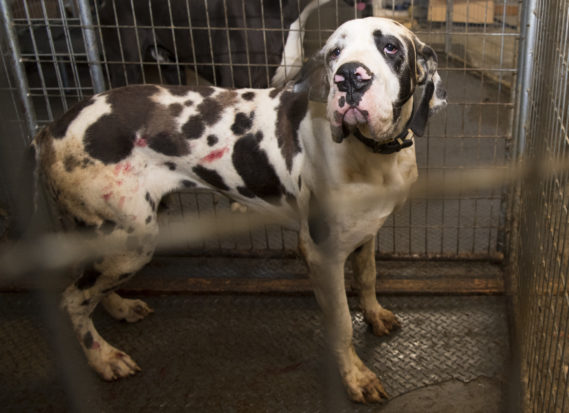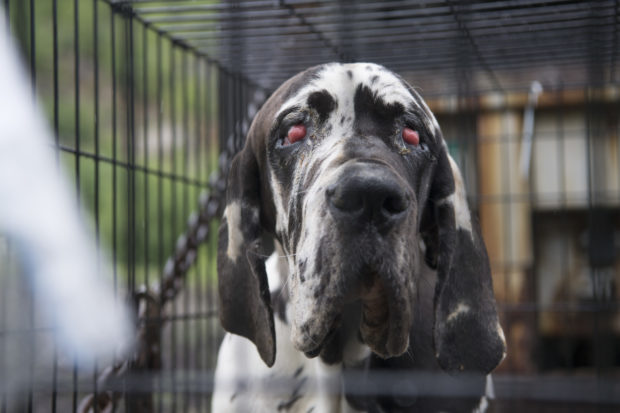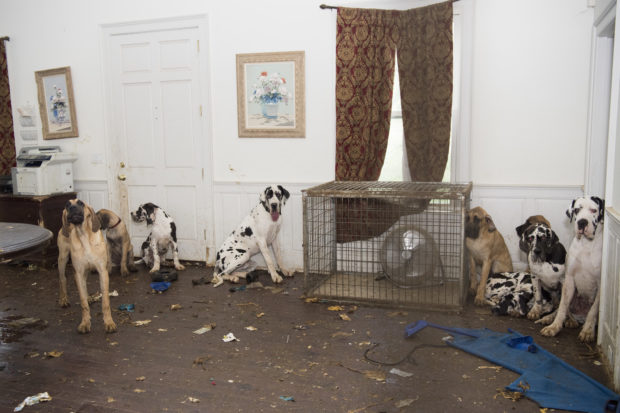
There were big dogs who had spent countless hours in cages. There was no sign of drinking water, just remains of raw chicken parts strewn around the dogs. Photo by Meredith Lee/The HSUS
The HSUS assisted the Wolfeboro Police Department with a puppy mill intervention not on a farm in Arkansas or a shack in North Carolina (two states where we’ve done major actions to help dogs), but rather in a mansion in northern New England. It is one of the most unexpected puppy mill operations our Animal Rescue Team has helped uncover – with 84 Great Danes caged inside a cavernous home where they should have been treated like canine kings and queens.
The mansion looked stately and opulent from the outside, but when our team entered the dwelling, they discovered something totally at odds with the elegant facade. They told me that the first thing that hit them was an overpowering rancid and putrid smell, with ammonia levels so high in some rooms that the rescuers’ eyes teared up. There were feces and debris smeared across all the walls to the point where the windows were opaque.
There were big dogs who had spent countless hours in cages. There was no sign of available water, just some remains of raw chicken parts strewn around the dogs.
When we think of puppy mills, we think of small breeds, such as Yorkshire terriers, French bulldogs, or Bichon Frises. Here we had one of the biggest of dog breeds, with their big paws, droopy faces, and friendly manner. But time and lack of care had changed some of their features. Some animals were underweight and looked sad or broken. Their paws were especially large, even for Great Danes, and appeared to be infected. Others had irritated eyes, made bright red or swollen shut like human boxers that had taken too many hits in a long fight.
Our team members said they are as large as ponies. One five-foot-tall rescuer said she stood eye to eye with some of the dogs.
Some animals looked sad or broken. Others had irritated eyes, made bright red or swollen shut like human boxers that had taken too many hits in a long fight. Photo by Meredith Lee/The HSUS
We took these beleaguered animals to a temporary shelter, where we will continue to work on healing their medical conditions and mending their spirits — so they know what it means to truly be loved.
Yesterday brought mercy to these dogs, who’ve now found a pathway away from misery. But as I’ve said many times, we cannot rescue our way out of the puppy mill problem. The HSUS is addressing this problem on multiple fronts, but we need policymakers to crack down on the cruelty. We have to adopt federal and state policies that prevent situations from deteriorating to this point, where we can intervene only when the situation is so severe that a puppy mill case becomes a crime scene and a case of animal cruelty.
Lawmakers in New Hampshire need to fortify the state’s weak laws on commercial breeding. Under current law, breeders in New Hampshire are required only to be licensed by the state Department of Agriculture if there are 50 puppies sold in one year. That is a high bar, exempting other high-volume breeders who should be covered by the law. And it’s difficult to enforce, with breeders who sell, or claim to sell, fewer puppies able to skirt the law and operate in a deregulated environment.
What’s more, New Hampshire lawmakers are considering a proposal right now to water down the state’s mandatory inspections for all pet licensees, like shelters, pet stores, and commercial breeders. If that attempt succeeds, the mandatory inspections will be replaced by a voluntary, complaint-based system, making it even harder for abusers to be held accountable.
Our team told me that the first thing that hit them when they entered the mansion was an overpowering rancid and putrid smell, with ammonia levels so high in some rooms that the rescuers’ eyes teared up. Photo by Meredith Lee/The HSUS
This case, like so many others where we’ve come to the aid of animals in distress, will place substantial financial burdens on The HSUS and our partners. Thanks to our members and other supporters, we’ll cover costs for sheltering and daily care and veterinary care for the animals, as well as the costs of running the temporary shelter for many months. But why should animal welfare groups and taxpayers bear these financial burdens instead of the people who mistreated the animals? And why is the law so weak that no regulatory authority comes in at an earlier stage to provide a course correction?
New Hampshire does not have a “cost of animal care” law, as many other states do, that would require defendants who have been charged with animal cruelty based on probable cause to pay for animal care costs while the case is being adjudicated. Since completing each legal proceeding can take months or even years, it is the animal protection movement that has to shoulder the costs of care. Twenty states, including Massachusetts and Maine, have such laws, and New Hampshire should, too.
We hope that the images of the animals in distress shake up and wake up authorities. These circumstances are preventable, and law enforcement and The HSUS shouldn’t have to ride to the rescue after animals have had to endure this kind of human neglect and trauma. We can’t rely on Scooby-Doo and his cohorts to solve these problems. This one is up to the people of New Hampshire and their elected officials to address.
The post Breaking news: The HSUS intervenes to stop outsized cruelty at a puppy mill in New Hampshire appeared first on A Humane Nation.
Related Stories
- More dogs pulled from the depths of the South Korean dog meat trade
- Breaking news: Dog meat sales at China’s Yulin festival likely banned for 2017
- BLM plotting war on wild horses
Enviroshop is maintained by dedicated NetSys Interactive Inc. owners & employees who generously contribute their time to maintenance & editing, web design, custom programming, & website hosting for Enviroshop.


